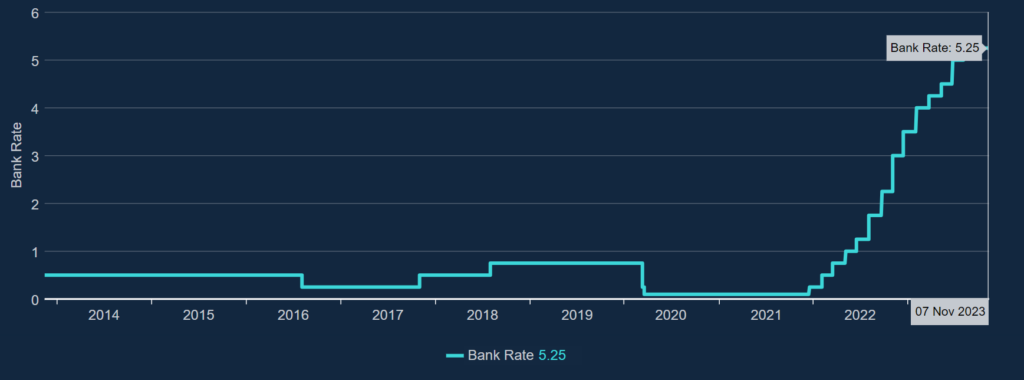Over the years, the UK has witnessed a gradual increase in interest rates. However, the Bank of England’s recent decision to maintain the base interest rate at 5.25% for the second time has left many wondering when the rates will decrease. Investors are particularly interested in the UK property market and its future implications. This blog post will explore the factors that have contributed to the rise in borrowing rates and the expected timeline for their decrease.
Key Takeaways:
- The Bank of England has recently kept the base interest rate unchanged at 5.25%.
- This rate, in turn, affects different areas in the economy, particularly the property market.
- Several factors contribute to the increase in borrowing rates, including economic growth and inflation.
- Predicting precisely when rates will decrease involves understanding these underlying factors and monitoring future economic indicators.

Source: www.bankofengland.co.uk
Why have interest rates been rising?
Interest rates in the UK have been increasing for several reasons. Firstly, the Bank of England raises borrowing rates to control inflation, which is one of the factors that prompts the increase. Secondly, the strength of the economy also plays a role. When the economy experiences strong growth, wages tend to increase, contributing to higher inflation. To prevent this, the Bank of England raises bank rates to slow down the economy and maintain control over inflation.
Why did the Bank of England hold the base rate at 5.25%?
The Bank of England kept the base rate at 5.25% due to a decrease in inflation over the past year. In October 2022, the CPI measure of inflation stood at 11.1%, which has now decreased to 6.7% as of September 2023. However, it is important to note that there was no change from the previous month. The Bank of England aims to maintain inflation around 2%, their target, and sees the decrease in inflation as a positive sign. It is likely that the Bank of England will continue monitoring it before making any decisions regarding interest rate reductions.
When will interest rates go down in the UK?
We all want an answer to the million-dollar question: “When will interest rates decrease?” Unfortunately, we cannot provide a fixed date or timeline for when this is likely to happen. Several factors determine when interest rates will come down, and predicting these factors is not always easy. The Bank of England must perform a difficult balancing act of controlling inflation without stifling the economy. If inflation continues to fall or remains stable, there is a possibility of interest rates decreasing in the near future.
How Does the Interest Rate Affect the Property Market in the UK?
Changes in interest rates affect the property market, raising questions for investors. High bank rates make saving more appealing than spending, potentially slowing down the property market. Conversely, when interest rates decrease, demand for property usually increases as more individuals are willing to take out mortgages. This can result in higher property prices. It is important to consider these factors when making investment decisions. While property investments can benefit from low-borrowing rates, it is crucial to also consider inflation and the state of the economy before making any investment choices.
How Rothmore Property Helps Navigate the Property Market
Rothmore Property takes pride in staying ahead of property investment news, ensuring our clients stay well-informed about market trends and changes. Our team of experts carefully monitors market trends and changes, including interest rates, inflation, and the economy, providing timely and helpful advice. Whether you’re a first-time buyer or an experienced investor, we are committed to guiding you through the property market. We understand the significant effects that changing interest rates can have on your investments and we provide assistance in navigating these changes with confidence and peace of mind.
In conclusion, we observe that the UK has experienced an increase in interest rates, but there are indications of a potential decrease in the near future. Various factors, including inflation, the state of the economy, and government policy, all contribute to the determination of when interest rates will decrease. As an investor, it is important to monitor and understand how these factors are impacted by the property market. While property investors may find low-interest rates appealing, it is crucial to consider other factors, such as inflation and the strength of the economy, before making any investment decisions. Stay informed, stay updated, and make well-informed investment choices.
Frequently Asked Questions
What does the base rate mean?
The base rate, set by the Bank of England, is the borrowing rate at which it lends to financial institutions. This rate affects all other interest rates in the UK economy, including the rates on mortgages and savings accounts.
How does inflation impact interest rates?
Inflation is one of the main factors affecting bank rates. When inflation is high, the Bank of England may increase interest rates to slow down the economy and manage the inflation rate.
What happens to the property market if interest rates go down?
Lower interest rates can make borrowing cheaper, leading to an increase in demand for mortgages. This, in turn, can drive up property prices due to increased demand.
How can I stay updated on interest rates and the property market?
At Rothmore Property, we stay on top of trends and changes in the property market, including borrowing rates, and provide timely updates and advice. To stay informed, consider subscribing to our newsletter.
What factors should I consider before making a property investment?
Before investing in the property market, it’s important to consider various factors, including bank rates, the state of the economy, inflation rates, and government policies related to the property market.












